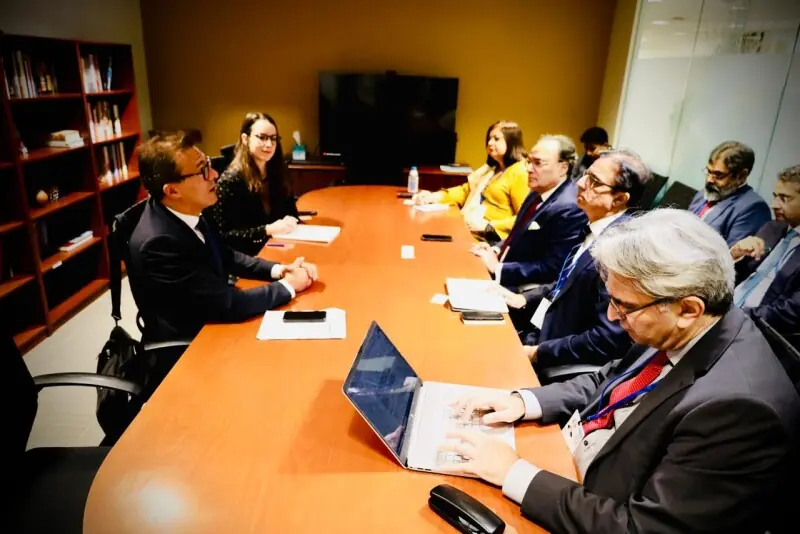Finance Minister Muhammad Aurangzeb said Pakistan plans to extend the maturity profile of its domestic and external debt portfolios to reduce refinancing and interest rate risks, as part of the government’s broader strategy to strengthen debt sustainability and financial resilience.
Aurangzeb continued his important engagements on the fifth day of his visit to Washington D.C., where he is attending the Annual Meetings of the International Monetary Fund (IMF) and the World Bank Group, read a statement released by the Finance Division.
During his meeting with Othman Boukrami, CIO and Deputy CEO of TCX, and his team, the finance minister welcomed collaboration to support hedging mechanisms for local currency loans.
He shared Pakistan’s plans to “extend the maturity profile of its domestic and external debt portfolios to mitigate refinancing and interest rate risks”.
Aurangzeb discusses post-flood recovery, economic reforms with World Bank chief
Aurangzeb also briefed the delegation on Pakistan’s intention to re-enter international capital markets through the issuance of Panda Bonds, Eurobonds, and International Sukuk, assuring a follow-up on proposals shared with the Ministry.
The finance minister also met with Baroness Jenny Chapman, UK Minister for International Development & Africa, and expressed appreciation for the United Kingdom’s longstanding development partnership with Pakistan.
During the meeting, Aurangzeb acknowledged the UK’s continued support for the development of the Digital Dashboard and underscored the importance of greater stakeholder consultation in project selection and implementation, as well as enhanced visibility for off-budget initiatives.
In a meeting with Dr Hajar El Haddaoui, Director General of the Digital Cooperation Organisation (DCO), the finance minister reaffirmed Pakistan’s commitment to the DCO’s mission of inclusive digital growth and cross-border collaboration.
He outlined Pakistan’s digital transformation priorities across three key verticals—information technology, payment rails, and digitisation of all government payments—while emphasising the importance of capacity building, skills development, and replication of successful digital models. He also welcomed the DCO’s decision to expand its footprint in Pakistan.
The finance minister also participated in a Roundtable on “Challenges and Opportunities for the Pakistani Economy through 2025 and Beyond”, organised by the Peterson Institute of International Economics (PIIE).
He briefed participants on the International Monetary Fund (IMF) staff-level agreement (SLA), the credit ratings upgrade by international agencies, and the ongoing transformation journey of the Federal Board of Revenue (FBR) centred on people, process, and technology.


